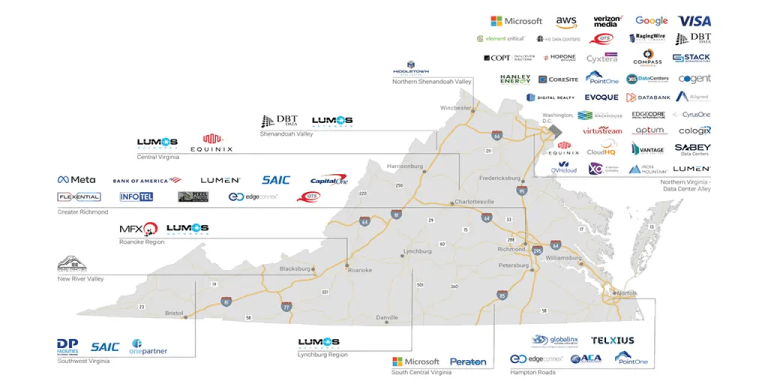From the Thomas Jefferson Institute for Public Policy
Steve Harner
Another analysis of the energy woes facing Virginia commissioned by a Democratic-controlled legislative panel concluded that the use of natural gas for power generation must increase, not decrease, in the coming decades. Virginia’s anti-hydrocarbon energy law is doomed to fail due to Virginia’s global dominance of the data center industry.
The new 150-page report provides a unique examination of Virginia's future energy needs and the optimal generation mix to meet that demand. It draws conclusions that Dominion Energy of Virginia also reached in its most recent integrated resource plan. As Dominion claims, the data centers themselves are driving a huge future demand curve. Even if data center growth is slower than current projections, the Virginia Clean Economy Act's (VCEA) mandate to move away from coal and natural gas will create energy shortages.
The Joint Legislative Audit and Review Committee (JLARC) hired energy consulting firm Energy + Environmental Economics (E3) to study future power needs arising from Virginia's prominent role in the data center industry. Using a proprietary model looking out to 2050, it produced several possible scenarios, but all included natural gas expansion and all resulted in significant rate increases, a parallel conclusion of the Dominion IRP.
In fact, this report predicts that natural gas must expand and will remain necessary beyond the decommissioning dates set out in the VCEA Even if the data center does not grow. It fills gaps in some cases by using hydrogen instead of natural gas in thermal power plants. But this is still an unproven experimental technology that is not yet being used on a large scale anywhere. A whole set of very expensive infrastructure is required to make the hydrogen and deliver it to Virginia power plants.
Only fantasy technology can qualify for fantasy VCEA. E3's nuclear power plant vision is somewhat closer to reality, but is still years or even decades away. “In the absence of policy, coal and natural gas power generation still play an important role, accounting for about 30% of demand,” the consultant reported. This is a slide labeled “No data center growth, no VCEA”. As demand grows, sources of carbon emissions become even more prominent, with some countries adding a new natural gas plant every two years.
Virginia's average citizen taxpayers, those who are not advised by utility accountants and attorneys, have good reason to be wary. Nearly everyone in the room will have an employer or client whom they seek to protect or enrich, or a political boss who relies on campaign contributions from companies present. Utilities and green energy advocates are major funders of what's left of Virginia's news media.
The financial rent-seeking and political power that got Virginia into this predicament is a perfect example of the wise warning to “be careful what you ask for.” As the JLARC report states, major financial incentives were established as early as 2010 to attract data centers to Virginia.
The state gives significant tax breaks on the sales tax collected when a data center is built and filled with computers. According to JLARC, the tax subsidy will be worth nearly $1 billion by 2023. In many cases, state tax inducements are combined with local incentives. Virginia is also attractive because there is a large network fiber backbone running through the state and federal customers located throughout the state.
It works. “Northern Virginia is the largest data center market in the world, accounting for 13% of global reported data center operating capacity and 25% of capacity in the Americas,” JLARC reports. There are also significant facilities in the Richmond area, a cluster in Virginia's Southern District (primarily Microsoft), and even a new mega-facility proposed for Appomattox.
Virginia Democrats don't want a lecture on energy realities they want from Dominion and have dismissed warnings about the PJM Interconnector's thermal retirement. Does the report from the consultant they commission convey this message?
Relevant
